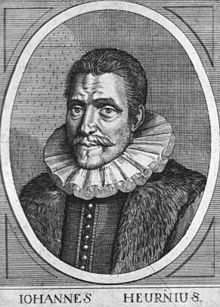Johannes Heurnius
| Johannes Heurnius | |
|---|---|
 Johannes Heurnius | |
| Born |
4 February 1543 Utrecht, Seventeen Provinces |
| Died |
11 August 1601 Leiden, Dutch Republic |
| Doctoral advisor |
Petrus Ramus Hieronymus Fabricius |
| Doctoral students | Otto Heurnius |
| Other notable students | Nicolaus Mulerius |
Johannes Heurnius (Jan van Heurne; 4 February 1543 – 11 August 1601) was a Dutch physician and natural philosopher.
Life
He was born in Utrecht, and studied at Leuven and Paris. He went to the University of Padua to study under Hieronymus Fabricius;[1] and graduated M.D. there in 1566, examined by Petrus Ramus and Fabricius.[2]
He wrote on the Great Comet of 1577; at that time he was town physician in Utrecht. In 1581 he became professor of medicine at the University of Leiden.[3] He had already a reputation and good contacts with humanist scholars; and was appointed as senior to Gerardus Bontius, an earlier physician on the faculty.[4]
He was a pioneer of the bedside teaching of medicine, and has been given credit for his methods.[5] From Padua he brought not only anatomy in the tradition of Vesalius, but anatomical demonstrations and practical clinical work.[1] It is not clear, however, if the 1591 proposal by Heurnius and Bontius to implement practical teaching on the Paduan lines was accepted officially.[4] The physician Otto Heurnius was his son;[6] Heurnius's ideas on teaching were transmitted widely through Otto, Franciscus Sylvius, Govert Bidloo and Herman Boerhaave.[1] After his father's death, Otto put together his lectures, published in the Opera Omnia, covering medicine both in theory and as a practical discipline.[4] He died in Leiden.
External links
- Heurnius' 'Commentary on Hippocrates' Aphorisms'
References
- ↑ 1.0 1.1 1.2 George Newman, Interpreters of Nature (1968), pp. 79–80;Google Books.
- ↑ Mathematics Genealogy page. Genealogy.math.ndsu.nodak.edu. Retrieved on 2012-04-16.
- ↑ Tabitta van Nouhuys, The Age of Two-Faced Janus: the comets of 1577 and 1618 and the decline of the Aristotelian world view in the Netherlands (1998), pp. 189–200; Google Books.
- ↑ 4.0 4.1 4.2 Kathryn Murphy and Richard Todd, "A man very well studyed": new contexts for Thomas Browne (2008), pp. 54–5; Google Books.
- ↑ The growth of medicine from the earliest times to about 1800. Archive.org. Retrieved on 2012-04-16.
- ↑ Wiep van Bunge et al. (editors), The Dictionary of Seventeenth and Eighteenth-Century Dutch Philosophers (2003), Thoemmes Press (two volumes), article Heurnius, Otto, p. 430–2.